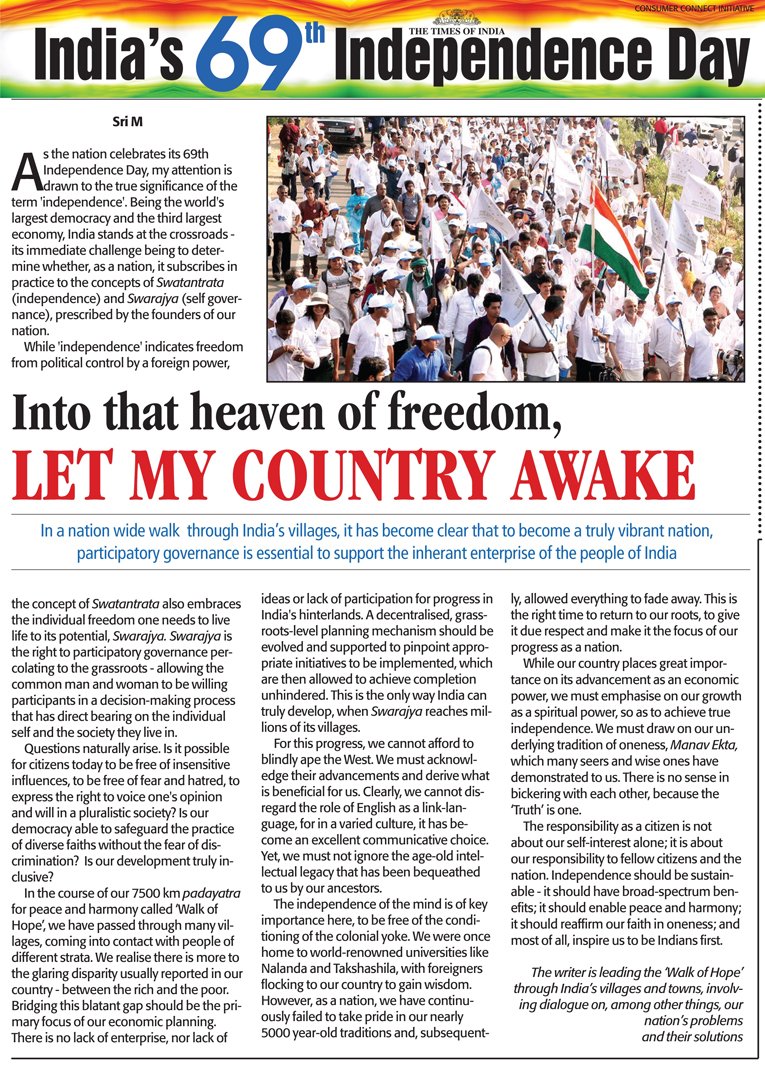As the nation celebrates its 69th Independence Day, my attention is drawn to the true significance of the term ‘independence’. Being the world’s largest democracy and the third largest economy, India stands at the crossroads—its immediate challenge being to determine whether, as a nation, it subscribes in practice to the concepts of Swatantrata(independence) and Swarajya(self governance), prescribed by the founders of our nation.
While ‘independence’ indicates freedom from political control by a foreign power, the concept of Swatantrata also embraces the individual freedom one needs to live life to its potential. In our country, it is the guarantee for a personal evolution that is also sustainable in a diverse society.To achieve the independence envisioned in Swatantrata, Swarajya is crucial. Swarajya is the right to participatory governance percolating to the grassroots—allowing the common man and woman to be willing participants in a decision-making process that has direct bearing on the individual self and the society they live in.
Questions naturally arise. Is it possible for citizens today to be free of insensitive influences, to be free of fear and hatred, to express the right to voice one’s opinion and will in a pluralistic society? Is the democracy able to safeguard the practice of diverse faiths without the fear of discrimination and bias? Is development truly encompassing, benefitting every single individual, and guaranteeing him or her fair benefits, leaving no one behind?
In the course of our 7500 km padayatra for peace and harmony called Walk of Hope, we have passed through many villages, coming into contact with people of different strata. We realise there is more to the glaring disparity reported in our country—between the rich and the poor. Bridging this blatant gap should be the primary focus of our economic planning. There is no lack of enterprise, nor lack of ideas or lack of participation for progress in India’s hinterlands. A de-centralized, grassroots-level planning mechanism should be evolved and supported to pinpoint appropriate initiatives to be implemented, which are then allowed to achieve completion unhindered. This is the only way India can truly develop, when Swarajya reaches millions of its villages.
For this progress, we cannot afford to blindly ape the West,as is generally seen nowadays.We must acknowledge their advancements in various areas, deriving what is beneficial for us. Clearly, we cannot disregard the role of English as a link-language—for, in a varied culture, it has become an excellent communicative choice to drive reforms forward. Yet, we must not ignore the age-old intellectual legacy that has been bequeathed to us by our ancestors. The independence of the mind is of key importance here, to be free of the conditioning of the colonial yoke. We were once home to world-renowned universities like Nalanda and Takshashila, with foreigners flocking to our country to gain wisdom. However, as a nation, we have continuously failed to take pride in our nearly 5000 year-old traditions and, subsequently, allowed everything to fade away.This is the right time to return to our roots, to give it due respect and make it the focus of our progress as a nation.
While our country places great importance on its advancement as an economic power, we must emphasise on our growth as a spiritual power, so as to achieve true independence. We must draw on our underlying tradition of oneness, Manav Ekta, which many seers and wise ones have demonstrated to us. There is no sense in bickering with each other, because the Truth is one. The responsibility as a citizen is not about our self-interest alone; it is about our responsibility to fellow citizens and the nation.Independence should be sustainable—it should have broad-spectrum benefits; it should enable peace and harmony; it should reaffirm our faith in oneness;and most of all,inspire us to be Indians first.

